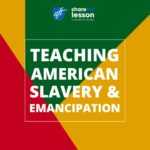International Women’s Day has been commemorated across the world on March 8th since 1911 and every U.S. President has marked March as Women’s History Month since 1995. While the right to vote is a common topic of study in classrooms when examining women’s history, there are many more issues, perspectives, and accomplishments that require investigation across history, literature, and the arts to more fully appreciate and understand what women’s history in the U.S. encompasses. Our Teacher’s Guide provides compelling questions, lesson activities, resources for teaching about the intersection of place and history, and multimedia resources to integrate women’s perspectives and experiences throughout the school year.
Documents and Debates in American History and Government – Vol. 1, 1493-1865
The Core Documents Collection – Documents and Debates is structured around a series of topics, each based on a question for debate. For each topic, there is a collection of documents that, together, form the basis of argument over that topic – from those who debated it at a given point in American history. Volume One covers 1493-1865, and Volume Two covers 1865-2009.
The goal is to explore a series of critical moments in American history by asking questions for which there are not simple yes/no answers, but instead call for informed discussion and rational debate. The Documents and Debates readers also include appendices of additional documents, and together are a perfect fit for any American History survey course, including AP U.S. History.
Landmarks of American History and Culture
This Teacher’s Guide provides information and resources for integrating creative approaches to place-based history in K-12 humanities education. As tangible reminders of the past, memorials and monuments, as well as neighborhoods, historic homes, waterways, and many other sites, have the power to influence how we interpret contemporary society. The resources herein address public history and the disciplines that fall within the field; NEH Landmarks of American History and Culture programs and the resources that have been developed for educators; and access to sites included in the National Register of Historic Places and National Historic Landmarks. By introducing historic and cultural sites into the classroom setting, students can develop a greater understanding of the reality and prevalence of history in their local landscape.
Documents and Debates in American History and Government – Vol. 2, 1865-2009
The Core Documents Collection – Documents and Debates is structured around a series of topics, each based on a question for debate. For each topic, there is a collection of documents that, together, form the basis of argument over that topic – from those who debated it at a given point in American history. Volume One covers 1865-2009.
The goal is to explore a series of critical moments in American history by asking questions for which there are not simple yes/no answers, but instead call for informed discussion and rational debate. The Documents and Debates readers also include appendices of additional documents, and together are a perfect fit for any American History survey course, including AP U.S. History.
American Slavery Lesson Plans: Teaching Hard History

If you are lesson planning for the school year, or getting ready to celebrate Juneteenth — the June 19 holiday recognizing the abolition of slavery — this Share My Lesson collection has what you need to teach preK-12 students the history of American slavery. This preK-12 lesson and activity curated collection is in response to a Southern Poverty Law Center report, “Teaching Hard History: American Slavery,” that shows that schools are failing to teach American Slavery. This collection of resources features some of our partner and users’ best material to ensure schools and teachers have the support they need to teach about the history of American slavery.
‘Life, Liberty, & the Pursuit of Happiness’ Digital Textbook
“Life, Liberty & the Pursuit of Happiness” is free online U.S. history resource for high school students. This textbook is the first entirely free U.S. history resource that aligns with AP standards. It is based on compelling stories that bring American history to life.
Learn About Black History, Culture and Politics
Learn about Black history in the United States before and after the Civil War; the Civil Rights Movement; the history of Africa; African American art; and African American trailblazers.
African American History Month Resources
African American History Month evolved from the birthdays of Abraham Lincoln and Frederick Douglass in the second week of February. Historian and author Dr. Carter G. Woodson framed the concept that became the first Negro History Week in February 1926. It developed into a monthlong commemoration of the struggles and triumphs of the African American community. On this page, learn the stories of Autherine Lucy Foster, the first African American student to attempt to integrate the University of Alabama; Frank M. Johnson, Jr., the federal judge who ruled in the Rosa Parks case; and Linda Brown, the 9-year-old who became the face of children caught in the crossfire of the fight for social change. The Pathways to the Bench video series features profiles of African American federal judges who offer perspectives on their experiences during the Civil Rights era.
Black History Month Lesson Plans on Nonviolence
The power of nonviolent actions and attitudes as a means to resist oppression and spur reforms is a recurring feature of democratic and democratizing societies. The School Violence Prevention Demonstration Program presents educators with lesson plans that explore the use of nonviolence in history, paying particular attention to the civil rights movement and African American history. Six lessons address: the 1963 Children’s March; the concept of nonviolence using primary sources and stories of participants in the civil rights movement; the power of nonviolence; the story of Rosa Parks; citizenship schools; how music can be used to achieve social and political change.
Why Study U.S. History, Government and History?
In an interview with Sal, John Dickerson, a correspondent for CBS’s “60 Minutes,” shares his views about the importance of studying US history, government and civics.